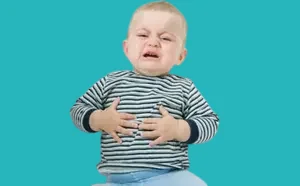Diarrhea in children is a common disorder that most children experience throughout childhood. It is characterized by an increase in the frequency of bowel movements, accompanied by a change in the consistency of the stool, which becomes more liquid.
Diarrhea may go away on its own, but it can be dangerous if accompanied by dehydration or persists for a long time, especially in infants. Therefore, it is important to understand its causes, symptoms, treatment, and prevention methods.
What is diarrhea in children
It is an increase in the frequency of bowel movements in children, accompanied by loose, watery stools. This causes the body to lose a significant amount of fluids and salts. It may be caused by an infection or contaminated food, and it may persist for a long time if associated with another health problem.
Causes of diarrhea in children
- Parasites.
- Bacterial infection.
- Intestinal infections.
- Viral infection.
- Eating contaminated food.
- Irritable bowel syndrome.
- Certain medications and antibiotics.
- Foods containing lactose or gluten.
What are the symptoms of diarrhea in children

The child may experience symptoms such as
- Excessive thirst.
- Loss of appetite.
- Bloating and gas.
- Watery and loose stools.
- General lethargy and weakness.
- Frequent bowel movements.
- Dry mouth and tongue.
- Abdominal pain and cramps.
Types of diarrhea in children
A child may suffer from acute diarrhea, which appears suddenly and lasts for two weeks and is often caused by a viral or bacterial infection. It may also be chronic diarrhea, which lasts for more than two weeks and is associated with a health problem such as a food allergy or intestinal disease.
There is also recurrent or intermittent diarrhea, which is characterized by the child suffering from it periodically, often due to irritable bowel syndrome or food intolerance.
Are there any complications of diarrhea in children
- Dehydration: One of the most serious complications is severe thirst and dry mouth.
- Weight loss: This results from a loss of fluids and nutrients.
- Malnutrition: This occurs due to poor absorption of minerals and vitamins.
- Growth failure: in cases of chronic and recurrent diarrhea.
- Kidney disorders: resulting from severe dehydration.
How is diarrhea diagnosed in children
First, the child's medical history is taken, and questions are asked about the duration and frequency of diarrhea, the consistency of the stool, and the presence of symptoms. The child is then examined and signs of dehydration are noted.
The doctor may request laboratory tests, such as a stool analysis to detect parasites or bacteria, and blood tests to assess salt and fluid levels.
Ways to prevent diarrhea in children

- Maintain personal hygiene.
- Breastfeed to strengthen the infant's immunity.
- Ensure that the child receives the necessary vaccinations.
- Provide uncontaminated, well-cooked foods.
Medications to treat diarrhea in children
Medications vary depending on the cause of the diarrhea and the child's age and may include:
- Antibiotics.
- Medications to reduce diarrhea.
- Antiparasitic medications.
- Solutions to replace lost fluids.
- Zinc supplements to improve immunity.
Summary of Diarrhea in Children
Diarrhea in children is frequent, watery stools, often caused by infection or food allergies. The main concern is dehydration, which can affect the child. Therefore, the primary treatment is fluid replacement.
Specific medications may be used under medical supervision, and prevention depends on hygiene, proper nutrition, breastfeeding, and vaccinations.